How to Teach Children to Celebrate Pride and Love
Christian parents and caregivers are responsible for teaching their children about pride and love from a biblical perspective. During June, these words have become words to honor the LGBTQ+ movement. Therefore, teaching children God’s perspective of being proud of ourselves and loving who we are becomes crucial. After discussing this topic with a preschool director, I wrote a blog post in June 2022. The organization this preschool director worked for asked her to promote Pride Month to her preschoolers. Her administrators suggested she set up a display of rainbow flags and stickers to give to two, three, four, and five-year-olds. Monies were allocated for a “Pride and Love” celebration. Aside from LGBTQ+ issues, teaching kids to love themselves and be proud of themselves seemed fitting. However, that can be tricky if we do not view pride and love as God does.
Therefore, I want to share how I address the topic in my own books. The main characters in my children’s picture books are vessels made by the Potter. They represent each of us and consequently react with pride and love that is wrong and good.
Read more: How to Teach Children to Celebrate Pride and LoveThe Little Pot Becomes Proud
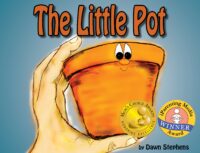
In the story of The Little Pot, the vessel is a proud paper pot after the Potter gives it papers to hold. It loves itself and feels brilliant. However, the Potter takes the papers away. Then, Little Pot holds coins and feels rich and proud. However, the Potter removes the coins, too. Then, Little Pot grows flowers and is proud of how it looks. Eventually, the flowers turn to fruit, and Little Pot discovers that growing fruit is the best purpose.
Little Pot is never wrong to be proud of what the Potter gives it. However, when it loses the items, it must wrestle with the idea that they are becoming more important than the Potter. Our pride is wrong when we love His gifts over Christ. Likewise, our pride should be in God, who gives us good things and uses us for good things. This idea is further explained in the second book, The Tea Pot.
The Tea Pot is Proud
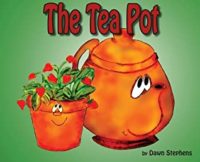
Even after the little Pot becomes a fruit-bearing vessel, pride creeps in. In The Tea Pot, a teapot convinces Little Pot that the fruit is something it should be proud of and keep. Therefore, the two vessels decided to keep their fruit and tea. Essentially, their fruit and tea are more important than loving and serving the Potter. In addition, they forget that the Potter is responsible for growing the fruit and brewing the tea. They are merely the vessels through which the Potter works. Children can discover that their creator uses them and be proud of God using them.
The Oil Lamp Burns Proudly
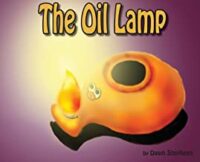
The third book, The Oil Lamp, also illustrates pride. In this story, a little oil lamp learns to shine a light. Yet, when the lamp becomes proud of the flame, it blazes hotter and burns the other vessels, causing them to move away from the light. We are to shine a light by sharing Jesus. However, this book prompts discussions about how our pride affects others. If we share Jesus in prideful and boastful ways, we can turn others away from Him, just as the oil lamp turned the other vessels away by proudly blazing a flame that scorched them.
Burnout and Wanting to Fit In.
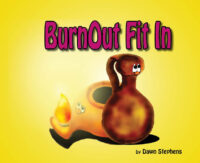
The fourth book, Burnout Fit In, tells what happens when pride appears after God elevates us to a higher calling or position. The oil lamp has been placed on a pedestal to shine above the other pots. Its position causes it to have pride and look down at the other vessels. Therefore, it becomes lonely and runs out of oil, symbolizing the Holy Spirit. Consequently, the Potter needs to refill the lamp. He uses a humble jar that does not feel like it fits in.
Each of these stories illustrates the battle we all have with pride. When we grow love, joy, peace, patience (etc.), we can become more focused on the character traits than the fact that they are the fruit of the Holy Spirit. Our Potter grows them through us. In the same way, we can also develop pride in how we shine. We begin to think we are the ones who create light and forget that God put the light inside us. In doing so, we “burn” so brightly that we turn others away from Christ instead of drawing them closer to Him. On our own, we will burn out.
When Pride Is Wrong
Pride is wrong when we value things over God. Pride is wrong when we no longer see God’s part in it.
“Keep seeking Jesus more than your calling”.
“Time Spent with Christ is far more important than the things I do for Christ of any title I hold”.–Beth Moore and Heather Riggleman
When Pride Is Good
Pride is good when we see that without God, we can do nothing (John 15:5). Therefore, our pride is in Christ, and we give God praise for the things we do and have. If we see things this way, we have humility. Likewise, God opposes the proud but gives grace to the humble (James 4:6).
Conclusion
The preschool director I mentioned in the first paragraph no longer works at that organization. She took a stand and refused to use the money to celebrate Pride Month. Instead, she bought children’s books that teach her students God’s definition of love and pride. We will continue to need to address the topic of pride and love with our children, and we must consistently remind them to be proud of God and love Him.
As a principal, I always tried to make sure my students gave God recognition when they did something extraordinary. I would say, “Thanks for letting God use you!” or “You did that? Isn’t God amazing to use you in that way?” It’s essentiaI to keep our kids’ focus on the fact that God works in us to do good. And we should always be proud of that!
Be sure to sign up to receive updates on each new post on our Christian Children’s Authors blog. Follow us for new book news, free resources, parenting tips, and encouragement!
#christianchildrensauthors #christianchildrensbooks #christianbooks #dawnstephensbooks #dawnstephens #picturebooks #christianteachers #june #pride #love #christianhomeschool

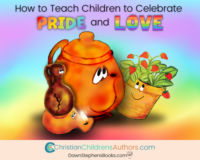
Thanks so much for sharing this, Dawn. These issues are creeping into schools at a younger and younger age. Children don’t need to celebrate “pride month.” We need to let them be children. The rainbow is a symbol of God’s promise to never destroy the whole earth with another flood.